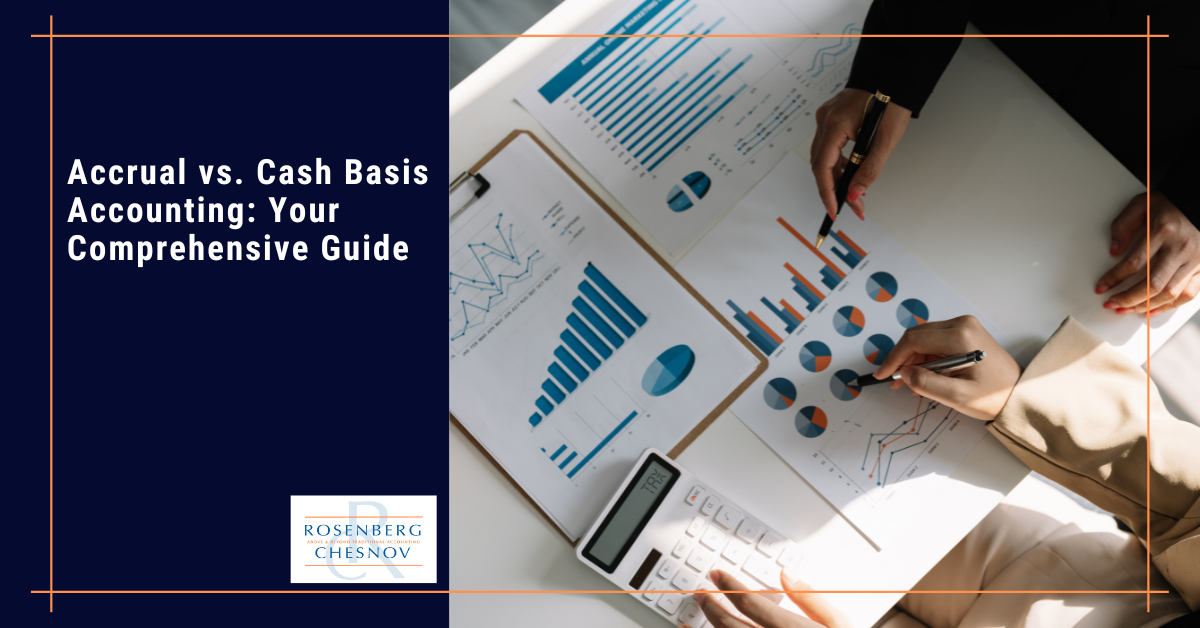

Maximize Your 2024 Refund: Tax Breaks You Might Be Missing
Category: Accounting
Are you struggling to determine the best way to track your business or personal financial transactions?
Do you find yourself puzzled by the nuances of accrual and cash basis accounting?
Whether you’re an individual taxpayer or a business owner, selecting the right approach is crucial. Good accounting is a cornerstone of any business, but smart record-keeping is just as vital for individual taxpayers. As we have previously discussed, an accurate and thoroughly-documented tax return is the key to maximizing your tax savings and avoiding fines, fees, or even an audit.
However, navigating the complexities of accounting methods can be daunting. How do you ensure that your tax return is accurate, comprehensive, and optimized for savings? The answer lies in understanding the differences between the accrual and cash methods.
Whether seeking clarity as an individual taxpayer or looking to optimize your business’s financial operations, this guide will equip you with the tools and understanding necessary to make informed decisions that align with your tax goals, financial management practices, and compliance obligations.
So let’s dive deeper into accrual vs. cash basis accounting methods, unravel their complexities, and pave the way for your financial success.


Accrual accounting records revenues and expenses when transactions occur, regardless of when cash related to those transactions is received or disbursed.
In other words, revenue is recorded when it is earned. This means that revenue is recognized when a product or service is delivered to a customer, even if payment is expected in the future. Similarly, expenses for goods and services are recorded before any cash disbursement.
The accrual method can provide a more accurate view of a company’s financial health by including accounts payable and accounts receivable. Large companies and publicly-traded entities commonly use it because it provides a comprehensive and long-term perspective on a company’s profitability.
On the other hand, cash basis accounting is a more straightforward accounting method that records revenue and expenses only when cash is received or disbursed.
Under the cash basis method, revenue is reported on the income statement only when cash is received, and expenses are recorded only when money is paid out. This method provides a snapshot of a company’s cash flow, making it easier to track and manage.
This approach is typically used by small businesses, sole proprietors, and individuals managing personal finances.
The primary distinction between accrual and cash basis accounting lies in the timing of revenue and expense recognition. While the cash method recognizes revenue and expenses immediately when cash is received or paid, the accrual method focuses on anticipated revenue and expenses.
To put it more simply, the cash method often allows you to defer the recognition of income, whereas the accrual method often allows you to accelerate it.
For example, if you purchase inventory on January 1 and it is delivered the same day, but you will only pay for the goods on April 1, you would wait until April 1 to record the purchase if using the cash method. On the other hand, if using the accrual method, you would record the purchase on January 1, when the goods are delivered.
The cash method can seem more straightforward and intuitive than the accrual method, but it needs to provide more accurate information. With the cash method, you don’t have any information about the money you are owed or owe until it is received or paid. With the accrual method, you can see the complete picture of your financial position, as this method records all transactions when they occur, regardless of when the cash is exchanged.
It’s important to note that 2017’s Tax Cuts and Jobs Act (TCJA) implemented procedural and regulatory changes, which led to complex alterations in accounting methods that can be challenging to comprehend.
For example, the TCJA brought significant changes to the eligibility criteria for using the cash method of accounting.
Previously limited to smaller businesses and specific revenue thresholds, the Act expanded the threshold to an impressive $25 million in 2017, with adjustments for inflation in subsequent years. This means entities with average annual gross receipts below the threshold may opt for the cash method.
However, exceptions apply, such as limitations for partnerships with losses allocated to limited partners and restrictions on tax shelters.
The TCJA also grants exemptions from specific accounting rules for inventories, cost capitalization, and long-term contracts, providing additional flexibility for eligible small businesses.
We went into more detail on accounting method changes brought on by TCJA previously on this blog.
Although the accrual method is more commonly used, particularly by publicly-traded companies, each accounting method has unique advantages and disadvantages. Understanding the impact of both methods is essential for businesses, investors, and individuals in making financial decisions.
When deciding between cash basis and accrual basis accounting for your business, several factors should be considered, including the size and complexity of your operations, compliance requirements, and the level of financial insight needed for decision-making.
Small businesses and sole proprietors may find the simplicity of cash basis accounting appealing, while larger companies or those with more complex transactions may benefit from the greater accuracy and detail provided by accrual accounting.
In some cases, businesses may opt for a hybrid accounting system, incorporating elements of both cash-basis and accrual-basis accounting. It’s crucial to consult with an accountant or financial professional to determine the best approach for your specific business needs.
Modern accounting software often accommodates both accrual accounting and cash basis accounting, allowing users to switch between the two methods as needed. This flexibility enables businesses to accurately track their financial transactions and generate reports based on their preferred accounting method.
As always, the best way to get personalized and nuanced advice about your unique tax and accounting circumstances is to reach out to an accounting professional; our team of experts stands ready to assist you with your needs.
If you are a client and would like to book a consultation, call us at +1 (212) 382-3939 or contact us here to set up a time.
If you aren’t a client, why not? We can take care of your accounting, bookkeeping, tax, and CFO needs so that you don’t have to worry about any of them. Interested? Contact us here to set up a no-obligation consultation.
Interested in receiving updates in your mailbox? Check out our newsletter, which is full of information you can use. It comes out once every two weeks, and you can register for it below.


Category: Accounting


Category: Accounting


Category: Accounting
Send us a message and we will contact you as soon as possible.
Jeff Coyle, CPA, Partner of Rosenberg Chesnov, has been with the firm since 2015. He joined the firm after 20 years of business and accounting experience where he learned the value of accurate reporting, using financial information as a basis for good business decisions and the importance of accounting for management.
He is a diligent financial professional, able to manage the details and turn them into relevant business leading information. He has a strong financial background in construction, technology, consulting services and risk management. He also knows what it takes to create organizations having built teams, grown companies and designed processes for financial analysis and reporting.
His business experience includes:
Creating and preparing financial reporting, budgeting and forecasting.
Planning and preparation of GAAP and other basis financial statements.
Providing insight on financial results and providing advice based on those results.
Jeff also has a long history of helping individuals manage their taxes and plan their finances including:
Income tax planning and strategy.
Filing quarterly and annual taxes.
Audit support.
General financial and planning advice.
Prior to joining the firm in 2015, Jeff was in the private sector where he held senior financial and management positions including Controller and Chief Financial Officer. He has experience across industries, including construction, technology and professional services which gives him a deep understanding of business.
Jeff graduated from Montclair State University, he is a CPA and member of the American Institute of Certified Public Accountants, New York State Society of Certified Public Accountants and New Jersey State Society of Public Accountants.
Jody H. Chesnov, CPA, Managing Partner of Rosenberg Chesnov, has been with the firm since 2004. After a career of public accounting and general management, Jody knows the value of good financials. Clarity, decision making, and strategy all start with the facts – Jody has been revealing the facts and turning them into good business results for more than three decades.
He takes a pragmatic approach to accounting, finance and business. His work has supported many companies on their path to growth, including helping them find investors, manage scaling and overcome hurdles. His experience and passion for business reach beyond accounting and he helps businesses focus on what the numbers mean organizationally, operationally and financially.
He has a particular expertise in early-stage growth companies. His strengths lie in cutting through the noise to come up with useful, out of the box, solutions that support clients in building their businesses and realizing their larger visions.
Prior to joining the firm in 2004, Jody was in the private sector where he held senior financial and management positions including General Manager, Chief Financial Officer and Controller. He has experience across industries, which gives him a deep understanding of business.
Jody graduated with a BBA in Accounting from Baruch College, he is a CPA and member of the American Institute of Certified Public Accountants and New York State Society of Certified Public Accountants.
In addition to delivering above and beyond accounting results, Jody is a member of the NYSCPA’s Emerging Tech Entrepreneurial Committee (ETEC), Private Equity and Venture Capital Committee and Family Office Committee.
He is an angel investor through the Westchester Angels, and has served as an advisor for many startup companies and as a mentor through the Founders Institute.